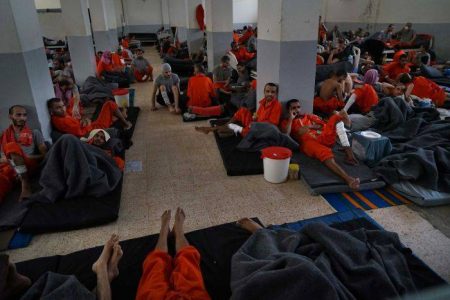
New security challenge as the European prisons are releasing 1000 returned Islamic State terrorists
The threat from ISIS will be greater after the release of 1,000 of its returned fighters from European prisons over the course of 2020, chief analyst at the UN told The National.
Efforts to reform Europeans from the ISIS battlefields through official deradicalisation programmes are largely regarded by officials as having failed to change the beliefs of members.
Edmund Fitton-Brown, a former British ambassador to Yemen who now serves as co-ordinator of the UN’s sanctions monitoring team, told The National that the coronavirus crisis was a hiatus for ISIS but the group could emerge as a more dynamic force.
Before the Covid-19 health crisis ISIS had the “smell of death” from a succession of defeats, but Mr Fitton-Brown warned that in its Iraq and Syria heartlands it could already seen to be “growing new confidence and becoming bolder”.
The most recent UN report from his panel in January concluded that ISIS had not regenerated its ability to operate abroad, the threat it poses in Europe and fragile states such as Afghanistan would be strengthened by prisoner releases, he said.
Recalling the attacks in France and Britain in recent months, Mr Fitton-Brown said returned fighters were coming out of “short-term incarceration” with the same frame of mind.
“It is a serious worry,” he said. “The truth of the matter is that they are not very effective in Europe. They are trying their best but deradicalisation programmes are not easy, straightforward things.”
While some of the most effective deradicalisation regimes involve a state-designed form of religious teaching, the best European approaches often hold more labour-intensive remedies such as segregation and avoiding over-crowding.
“A lot of professionals have told me how difficult it is in prisons due to the challenges they pose such as overcrowding issues,” Mr Fitton-Brown said.
Attacks such as those carried out in London by freed prisoners Sudesh Amman in February and Usman Khan last November could be emulated by newly released ISIS members.
“The two terror attacks in the UK show this,” Mr Fitton-Brown said.
Europe’s security is already threatened by a high number of terrorist prisoners who may not have travelled to the ISIS footholds but are due to leave prison soon.
“It is made more problematic by the release of extremists and terrorists who are not foreign fighters,” he said.
“It makes the figure for the number being released significantly higher. It begs the question of the effectiveness of deradicalisation programmes.”
The regrouping of ISIS after its defeat at the hands of the global coalition to fight it is certainly a reason not to disband the 82-nation effort, even as the nature of the threat shifts.
“It’s difficult sustaining a united front as the military campaign has been won but the wider counter-terrorism campaign is not yet won,” Mr Fitton-Brown said.
The underlying social and economic factors that push recruitment to ISIS and a regenerating Al Qaeda in some regions are likely to be compounded by the fallout from Covid-19, he said.
The International Monetary Fund and other forecasters are predicting a severe downturn in global growth as a result of the crisis.
On that basis the task of undermining the extremist groups and their messaging becomes harder across the globe.
Source: The National





